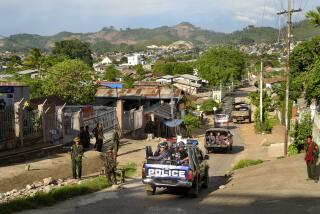Somalia government steps gingerly toward its capital
- Share via
MOGADISHU, SOMALIA — Leaders from Somalia’s capital gathered Saturday where matters of importance are often debated and settled here: under the shade of a thorny aqab tree.
This one was at a bombed-out military barracks on the edge of Mogadishu, chosen because the guest of honor, President Abdullahi Yusuf, refuses to enter a notoriously dangerous city that until last week had been under the control of an Islamist alliance. “I will come to Mogadishu once everything is in place,” he said.
Though most Islamist fighters fled Thursday when troops from Ethiopia and Somalia’s transitional government advanced, so far the government is moving cautiously in finishing the pacification and occupation of the capital. Most government soldiers remain on the city outskirts. Only one government agency, the Interior Ministry, has moved back in.
The security vacuum has led to sporadic looting and rioting. Local leaders warned that the transitional government might lose control of the capital if it did not act quickly to solidify its victory.
“People are already hiding their guns underground,” said Ibrahim Shawey, the former mayor of Mogadishu. “I urge the government to use force [to disarm the city], rather than negotiate.”
Part of the delay is strategic, officials said, with government forces needed elsewhere in the country. On Saturday, thousands of Ethiopian-led troops were heading south to the last Islamist holdout in Kismayo, about 280 miles from Mogadishu. Town leaders there briefly drove the Islamists out last week, but the region was overwhelmed again by hard-line fighters after they fled the capital.
Leaders of the Islamic Courts Union, supported by an extremist faction known as Shabab and some suspected foreign fighters, are threatening to make a last stand against Ethiopian soldiers in the region.
“Islamic Court officials will not surrender,” said the alliance’s chairman, Sheik Sharif Sheik Ahmed. “We will defend ourselves and defeat the enemy.” He issued similar threats in Mogadishu, only to abandon the capital without a fight.
Prime Minister Ali Mohammed Gedi said Saturday that a battle was possible if the Islamists refused to give up or flee. “If remnants try to attack, bloodshed will take place,” he said.
But the possible final showdown was sapping needed troops inside Mogadishu. Pacifying the capital will not be easy, Interior Minister Hussein Aidid said.
An estimated 2,000 armed opponents, including some Islamist fighters, are believed to be hiding in the city, and it is feared that Islamists may have left behind mines or booby traps.
Although the Islamic Courts Union collected the guns of militias and citizens at the beginning of its six-month reign, it redistributed them shortly before leaving the city. As a result, Mogadishu is once again awash in guns, particularly among two clans with a history of animosity toward the transitional government.
Many say they will keep their weapons. “I’ll never give up my gun, either to the government or to the Ethiopians,” said Iman Adan, 31, who worked at a high school before joining the Islamic Courts. “I’m ready to fight or die.”
Government officials won’t say how many troops are providing security inside the city.
Yusuf, who took a great deal of ribbing Saturday for his reluctance to enter Mogadishu, vowed to immediately implement a disarmament program, by force if necessary. Gedi predicted the guns would be collected within three weeks.
But both men said Mogadishu’s leaders must share the responsibility by supporting the government, including the deployment of Ethiopian troops, and by controlling their children. In recent days, much of the anti-Ethiopia looting and rioting has involved teenagers.
“You must welcome the president not only by mouth, but by heart,” said Gedi, who was targeted by assassins twice last year during visits to the capital. “In the past, you were welcoming me, but not working with me.”
Special correspondent Abukar Albadri contributed to this report.
More to Read
Sign up for Essential California
The most important California stories and recommendations in your inbox every morning.
You may occasionally receive promotional content from the Los Angeles Times.









